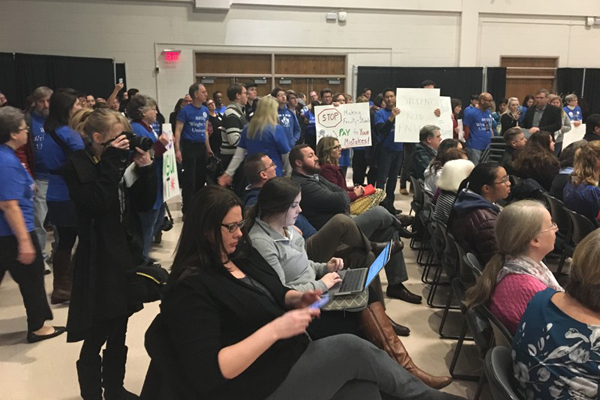
Excerpt from the Dayton Daily News
A fact-finder’s report concerning ongoing contract negotiations between Wright State University’s administration and faculty union has been delayed.
The report, originally expected out Sept. 11, now may not be out until Oct. 29, according to the university and the Wright State chapter of the American Association of University Professors.
Once the report is issued, the WSU-AAUP plans to hold two informational meetings for members, said Martin Kich, president of the union.
What is at dispute, according to union
- Earlier this year, the administration offered the union a three-year contract with no raises, reduced health benefits with higher premiums and a new furlough proposal, according to a January email from the AAUP-WSU.
- The reduction in benefits would amount to a 4 percent pay cut and a furlough, which could last up to two weeks, could amount to a 5 percent pay cut, according to the AAUP-WSU.
- That proposed contract would also give the administration more discretion in assigning workloads, parking fees, life and disability insurance and tuition and fee remission, among other things, according to the AAUP-WSU.
- The most recent three-year contract gave faculty around an annual 3 percent raise, Kich said.
What WSU administration is saying
- The fact-finder cited personal reasons for the cause of the delay in the report, according to an email from the administration sent to campus today.
- The email also stated that “the university is doing everything in its power to reach a collective bargaining agreement with AAUP-WSU.”
- WSU spokesman Seth Bauguess said the university would not comment on strike plans while negotiations are still ongoing.
- In an email to the campus community last month, WSU president Cheryl Schrader wrote “talk that a strike is imminent is still premature.”
- She said the university is “working hard” to “avert a strike” by reaching an agreement with the leaders of Wright State’s chapter of the American Association of University professors.
- Contract negotiations between Wright State University and its faculty have been stalled since March 2017. The union’s contract expired in June 2017 but it remains in effect until after the fact-finder’s report is issued.
What happens when report is released
Members will then vote for more than a week on the report, which will propose a sort of compromise contract, Kich has said. At least 60 percent of the union’s membership would have to turn down the fact-finder’s proposal to begin initiating a strike. The delay means strike plans for the union will also be postponed, Kich said. The union had previously set Oct. 1 as its official strike date.
“We’re gonna have to wait and see when the report actually comes out and we’ll kind of adjust things accordingly,” Kich said. “I don’t think it has actually changed anything except the timeline.”
Though Kich said he hopes the union and administration “settle this thing,” if a strike occurs, at this point it would likely start toward the end of the fall semester or beginning of spring semester, Kich said. Before November, the WSU faculty union did not even have a formal plan that would allow them to strike if they decided to.

